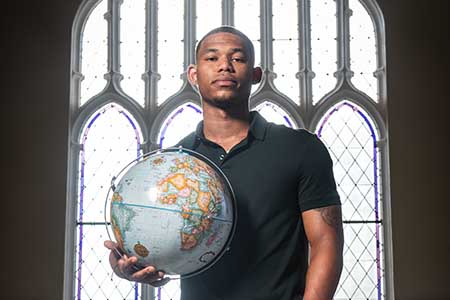Passionate about policy
By Malorie Sougéy
 Bradley Richards knows a thing or two about policy and the effect it can have on a country and its citizens.
Bradley Richards knows a thing or two about policy and the effect it can have on a country and its citizens.
“There is a lot of economic disparity in our world, and much of it has been created through policy,” said Richards, a first-generation Kansas State University senior in economics in the College of Arts and Sciences. “I’m really passionate about making change for people who are affected by these policies.”
The Wichita native learned about this firsthand when he traveled to Nyeri, Kenya, through the Staley School of Leadership Studies International Service Teams program. He noticed that numerous local businesses were being bought out by foreign companies.
That experience led him to study the influence of foreign capital on economic growth in sub-Saharan Africa with faculty mentor Michael Flynn, associate professor of political science. Flynn and Richards teamed up through the Developing Scholars Program, or DSP, which is a unit in the larger Office of Undergraduate Research and Creative Inquiry. DSP offers high-achieving, historically underrepresented students the opportunity to conduct research in their fields with faculty mentors.
“I’ve been in the program since my freshman year and it’s been the most transformative process,” said Richards, who is also pursuing minors in statistics and political science and a pre-law designation. “I am extremely thankful for the relationships I’ve been able to build with my mentors and everyone in the DSP family. My mentors are researchers who are challenging existing ideas and developing their own. They’re on the forefront of research and society, and that drives my ambition to do research.”
Richards collaborated with Flynn and used measures of gross national income and gross domestic product in 48 African countries over 10 years to determine economic growth. Then, using his statistics minor, he took a cross-sectional linear regression to see how that growth was affected by foreign direct investment and foreign aid.
“This research could be important to policymakers for these countries,” Richards said. “Depending on the size of their economy, studies like mine can help determine where the focus of their foreign capital policies should be, whether it’s foreign aid or investments.”
Richards presented his research at the Developing Scholars Virtual Research Symposium in spring 2021. His future research goals are to travel and understand people’s perspectives of the foreign capital inflows on local businesses.